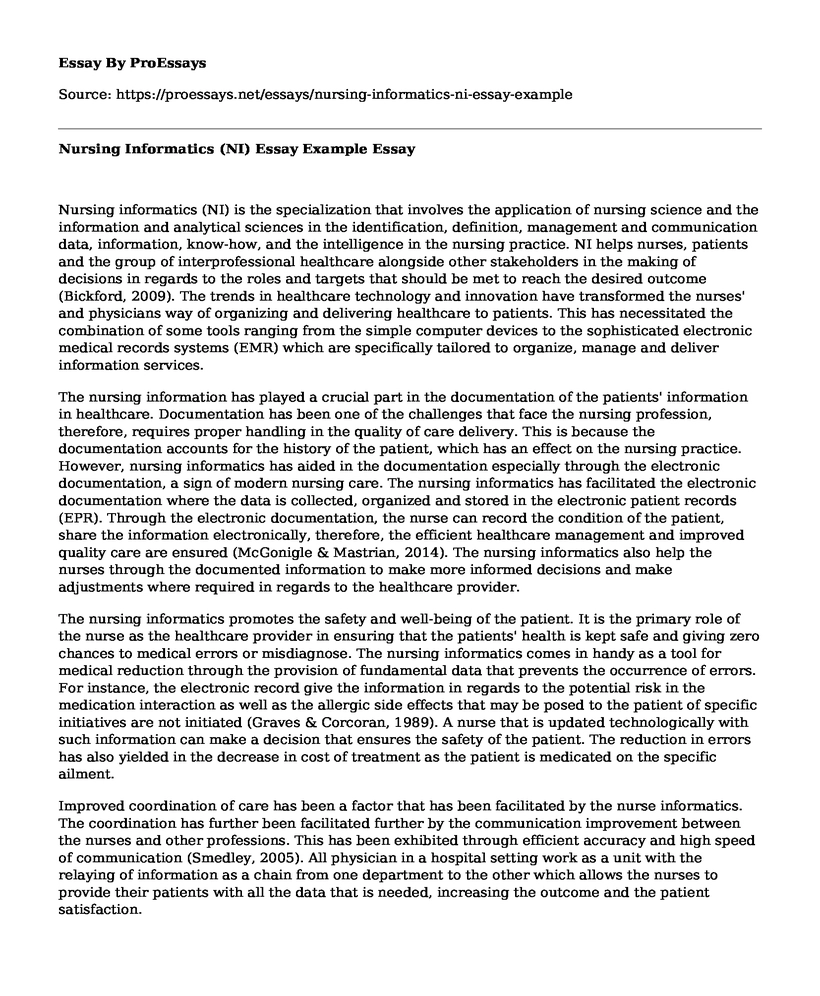Nursing informatics (NI) is the specialization that involves the application of nursing science and the information and analytical sciences in the identification, definition, management and communication data, information, know-how, and the intelligence in the nursing practice. NI helps nurses, patients and the group of interprofessional healthcare alongside other stakeholders in the making of decisions in regards to the roles and targets that should be met to reach the desired outcome (Bickford, 2009). The trends in healthcare technology and innovation have transformed the nurses' and physicians way of organizing and delivering healthcare to patients. This has necessitated the combination of some tools ranging from the simple computer devices to the sophisticated electronic medical records systems (EMR) which are specifically tailored to organize, manage and deliver information services.
The nursing information has played a crucial part in the documentation of the patients' information in healthcare. Documentation has been one of the challenges that face the nursing profession, therefore, requires proper handling in the quality of care delivery. This is because the documentation accounts for the history of the patient, which has an effect on the nursing practice. However, nursing informatics has aided in the documentation especially through the electronic documentation, a sign of modern nursing care. The nursing informatics has facilitated the electronic documentation where the data is collected, organized and stored in the electronic patient records (EPR). Through the electronic documentation, the nurse can record the condition of the patient, share the information electronically, therefore, the efficient healthcare management and improved quality care are ensured (McGonigle & Mastrian, 2014). The nursing informatics also help the nurses through the documented information to make more informed decisions and make adjustments where required in regards to the healthcare provider.
The nursing informatics promotes the safety and well-being of the patient. It is the primary role of the nurse as the healthcare provider in ensuring that the patients' health is kept safe and giving zero chances to medical errors or misdiagnose. The nursing informatics comes in handy as a tool for medical reduction through the provision of fundamental data that prevents the occurrence of errors. For instance, the electronic record give the information in regards to the potential risk in the medication interaction as well as the allergic side effects that may be posed to the patient of specific initiatives are not initiated (Graves & Corcoran, 1989). A nurse that is updated technologically with such information can make a decision that ensures the safety of the patient. The reduction in errors has also yielded in the decrease in cost of treatment as the patient is medicated on the specific ailment.
Improved coordination of care has been a factor that has been facilitated by the nurse informatics. The coordination has further been facilitated further by the communication improvement between the nurses and other professions. This has been exhibited through efficient accuracy and high speed of communication (Smedley, 2005). All physician in a hospital setting work as a unit with the relaying of information as a chain from one department to the other which allows the nurses to provide their patients with all the data that is needed, increasing the outcome and the patient satisfaction.
Conclusion
The nurses have become agents of change on the assumption of the nursing informatics role which consequently has yielded positive change in the healthcare and nursing practice. It has resulted in the quick and efficient delivery of the services by the nurses which has promoted more productivity which has led to a notable change in the patient care in the healthcare organization.
References
Bickford, C. J. (2009). Nursing informatics: scope and standards of practice. Studies in health technology and informatics, 146, 855-855.
Graves, J. R., & Corcoran, S. (1989). The study of nursing informatics. Image: the journal of nursing scholarship, 21(4), 227-231.
McGonigle, D., & Mastrian, K. (Eds.). (2014). Nursing informatics and the foundation of knowledge. Jones & Bartlett Publishers.
Smedley, A. (2005). The importance of informatics competencies in nursing: an Australian perspective. CIN: Computers, Informatics, Nursing, 23(2), 106-110.
Cite this page
Nursing Informatics (NI) Essay Example. (2022, Nov 20). Retrieved from https://proessays.net/essays/nursing-informatics-ni-essay-example
If you are the original author of this essay and no longer wish to have it published on the ProEssays website, please click below to request its removal:
- Understanding ISO 27001 and Auditing the Security Program
- Evidence-Based Practice Annotated Bibliography
- Community Teaching Plan: Healthcare Access in Hispanic Communities Paper Example
- Response to "Voices of Friendship" Video Paper Example
- Essay Example on Perineal Care: Prevent Burning, Odour & Itching Infections
- Research Paper on Bats & Viruses: The Spillover Effect & Coronavirus
- Free Essay Example on Getting Back on Your Feet: Post-Illness Advice from a Patient







